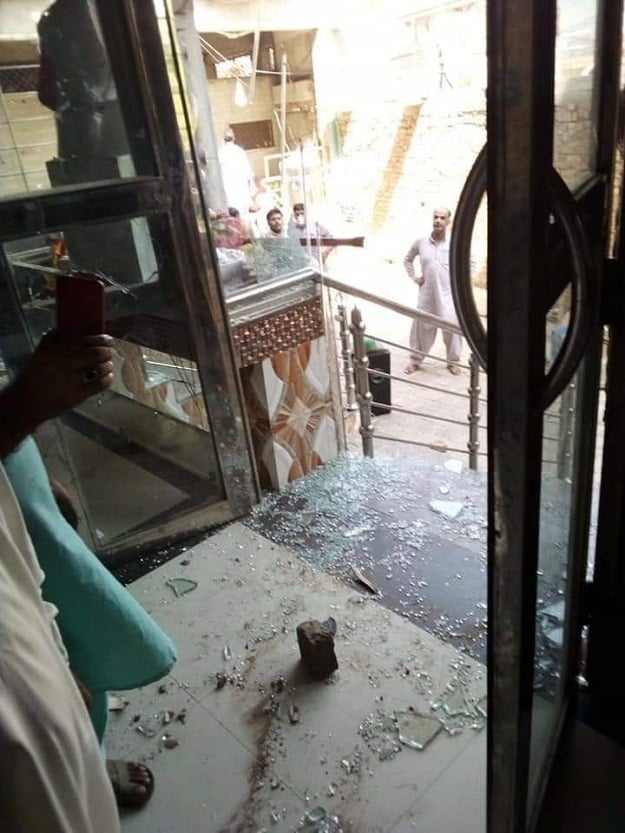Pakistan’s infamous Blasphemy laws are back in the news as violent mobs ransacked school, Hindu temple over alleged charges of blasphemy in Sindh’s District Ghotki.
Blasphemy Laws in Pakistan – The World’s Most Draconian Law?
Blasphemy Laws in Pakistan are one of the most draconian laws in the world and carry a possible death sentence to anyone who insults Islam or the Prophet. The British Era Blasphemy Laws continues to be the hallmark of the human rights violations in Pakistan, as it has been widely misused against the minority communities and fellow Muslims.
The mob attacked a school – Sindh Public School – and desecrated a temple in the area over allegations of blasphemy against the school principal, who is from the minority and Hindu community.
Alarming reports of accusations of blasphemy in #Ghotki and the outbreak of mob violence. https://t.co/PEc15iBsJi
— Human Rights Commission of Pakistan (@HRCP87) September 15, 2019
Reports suggest houses of Hindu families were attacked and the mob has blocked the roads leading tp the area. The rioting comes after a student accused the Hindu teacher of passing blasphemous remarks.
The police have registered an FIR against the victim (school teacher) on behalf of the student’s father includes Section 295-C of the Pakistan Penal Code, which pertains to the use of defamatory remarks against Prophet Mohammed.

PHOTO: TWITTER
Activists and journalists used Twitter to share videos and images of the rioting in Ghotki and appealed to the Sindh government and law enforcement agencies to protect the vulnerable Hindu community.
https://twitter.com/shamshad_bhutto/status/1173176983670460416
Sukkur Additional IGP Dr Jamil Ahmed confirmed the worrying developments in a tweet, saying that police were “trying to deal with a serious situation”. The rioters allegedly include supporters of notorious religious leader Pir Abdul Haq alias Mian Mithu, who is widely accused of involvement in forced conversion of Hindu women in Sindh.
The situation in Ghotki, Sindh over the blasphemy accusations against a Hindu principal is getting out of control. Extremists have desecrated a temple, attacked homes of Hindu community members and blocked roads. Report and video via Shankar Meghwar pic.twitter.com/j6qca5qt2d
— Bilal Farooqi (@bilalfqi) September 15, 2019
Yes we are trying to deal with a serious situation in a cool, calculated, impartial and professional manner. Moderate and educated sections of society must fully support our earnest efforts to do justice and maintain peace in Ghotki, please https://t.co/6beA0dgtCx
— IGP Dr. Jamil Ahmed PSP, PPM (@jahmed95) September 15, 2019
History of Blasphemy Laws in Pakistan
The crimes relating to religion were initially penned by British rulers in India. Pakistan inherited these laws after the partition of India and creation of the new state of Pakistan. Between 1980 – 1986, the blasphemy laws were modified and a significant number of clauses were added to it on commands of the military government of General Zia-ul Haq.
General Zia-ul-Haq was very passionate to completely “Islamicise” Pakistan. He also strived to make a successful attempt to separate the minority Ahmadi community from Islam, and thus declared them non-Muslim in 1973. Even today, the minority Ahmadiyya community is not only discriminated against but also highly persecuted in Pakistan and not considered Muslims.
What does the Blasphemy Laws Say?
The law passed by the British Empire in India made it a criminal offence to disturb a religious gathering, transgress on burial grounds, ridicule religious sentiments or wilfully damage or dishonour a place or an object of worship. The maximum punishment under these laws ranges up to 10 years in jail.
During the 1980s in Pakistan, the blasphemy laws were amended and included a punishment up-to three years who would make any derogatory remarks against Islam. Another clause was added a couple of years later, which designated life imprisonment for intentional disrespect of the Islamic Holy Book, the Koran. A few years later in 1986, an additional clause was included to punish anyone who insults the Prophet Muhammad with the death penalty or life imprisonment.
Who is affected by the Blasphemy Laws in Pakistan?
The Human Rights Commission has been recording blasphemy cases in Pakistan for a long time. Their report says that around 40% of people booked under the blasphemy laws belong to the highly discriminated and targeted, Ahmadiyya community.
Around 40’% of people convicted under Blasphemy Laws in Pakistan were of Ahmadiyya Community
A considerable majority of people support the idea that people should be punished to insult Islam, but there is inadequate knowledge of what religious books actually say. Many people support the blasphemy law, which was implemented by the military dictator General Zia-ul-Haq, and is considered direct adaption from the Koran.
When Punjab Governor Salman Taseer was assassinated who was an eminent detractor of the notorious blasphemy law, Pakistan remained divided, with some hailing his assassin “Mumtaz Quadri” as a hero.
Can Blasphemy Laws in Pakistan be Amended?
Revising the blasphemy laws in Pakistan has been on the list of almost all major political parties. However, none of the parties was able to make headway, not only because it was a delicate issue, but because no major political party wanted to offend the religious ulemas, who hold significant sway over the people.
Right after a month of the assassination of Punjab Governor Salman Taseer, Clement Shahbaz Bhatti – 1st Federal Minister of Minority Affairs in Pakistan and a Roman Catholic, was assassinated in Islamabad after he allegedly criticized the outdated blasphemy laws.
Sherry Rehman – a member of the then ruling government introduced a bill to revise the blasphemy law. The bill was an attempt to reform the process of blasphemous offences where every alleged blasphemous offence would be reported to a senior police official and the cases heard undeviatingly by the top courts. The bill was moved to a congressional board for vetting but was later withdrawn under pressure from religious ulemas and political parties.